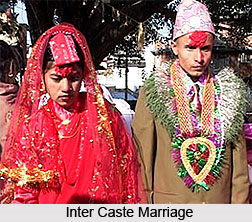Inter-caste marriage (ICM), also known as marrying out of caste, is a form of exogamous nuptial union that involve two individuals belonging to different castes. They are particularly perceived as socially unacceptable and taboo in most parts of South Asia. It prevailed in India as a result of a very rigid caste system. Upper caste people would not have any marriage alliance with lower caste people. The caste system is a dominant idea of being hereditary superior and “pure” to others (prescribed Varna). Thus, the practice of marriage within the caste ensures the hierarchy is maintained and in case of its violation, violence is committed.
Inter-caste marriages may not be accepted by families, and they may pressure their children to marry within their caste. Parents may even resort to emotional blackmail, threats, or physical violence to prevent their children from marrying outside their caste. Most of these marriages remain as love marriages even today, where the bride and the groom would decide to get married and get into an adjustment for life. Hence, these marriages are more common in cities rather than villages in India. It's a given that marrying someone of a different caste means getting to learn new things. You will learn how a certain culture is, their way of living and also their cuisine. You will also get to celebrate different festivals which means more fun and celebrations at home. Life becomes a happy journey because of this.
The Bhagavad Gita does not ban inter-caste marriage. The Bhagavad Gita describes castes as related to a person's thoughts and not their social status. According to the Bhagavad Gita, the nature of your thoughts determine the caste you are in.
The Supreme Court of India has also declared that inter-caste marriages are in the national interest and a unifying factor for the nation and there has never been a bar on inter-caste or inter-religion marriages in independent India.
